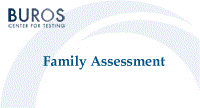Buros-Nebraska Series on Measurement and Testing

Family Assessment
Date of this Version
1995
Document Type
Article
Citation
Family Assessment, ed. Jane Close Conoley & Elaine Buterick Werth (Lincoln, NE: Buros Institute of Mental Measurements, University of Nebraska-Lincoln, 1995).
Abstract
The previous two sections of the volume described family assessment related to the usual issues faced by families. In this final section, the papers are concerned with assessment approaches with families facing particular challenges. Chapters concerning divorce, aggressive children, and the effects of a child with a disability on family and child functioning comprise the third section.
Dr. Paul Amato notes that empirical investigation into the impact of divorce on children lacks the theoretical base that would provide a solid foundation for future research. Amato suggest that current research includes too many dependent variables which results in weak outcomes. Studies also fall short when global constructs are assessed with lack of attention to the specific indicators that form those constructs. Many of the instruments currently in place for assessing outcomes have questionable reliability and validity. This results from small, nonrandom samples being used with multiple item measures. Amato offers a review of causal models of the effects of divorce and provides a thorough critique of each with its associated measurement approaches.
Elaine B. Werth tackles the difficult assessment challenge of measuring the effects of family/parent training for families who have aggressive children. With youth violence a national priority for reduction, the need to develop and validate approaches to help families cope with and change the behavior of aggressive children is critically important.
Dr. Marjorie Padulla considers families who have had to organize around a member's disability. The assessment challenges include finding measures that: (a) emphasize strengths, not just pathological elements of the family's experience; (b) can gather information from all family members including the person with the disabilities; (c) allow for a broad focus on family dynamics not just on the relationship of family members to the person with the disability; and (d) have psychometric qualities that allow for confident use with the special families.
Included in
Educational Assessment, Evaluation, and Research Commons, Family, Life Course, and Society Commons, Quantitative, Qualitative, Comparative, and Historical Methodologies Commons


Comments
Copyright © 1995 by Buros Institute of Mental Measurements. Digital Edition copyright © 2012 Buros Center for Testing.